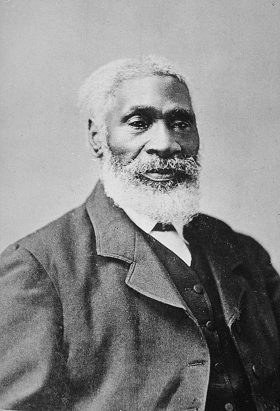Josiah Henson
| Josiah Henson | |
|---|---|

Josiah Henson in 1877
|
|
| Born |
June 15, 1789 Charles County, Maryland, United States |
| Died | May 5, 1883 (aged 93) Dresden, Ontario, Canada |
| Nationality | American, Canadian |
| Other names | Uncle Tom |
| Occupation | author, abolitionist, minister, colonizer, soldier, army officer |
| Spouse(s) | Nancy Henson |
| Relatives | Matthew Henson |
| Signature | |
Josiah Henson (June 15, 1789 – May 5, 1883) was an author, abolitionist, and minister. Born into slavery, in Port Tobacco, Charles County, Maryland, he escaped to Upper Canada (now Ontario) in 1830, and founded a settlement and laborer's school for other fugitive slaves at Dawn, near Dresden, in Kent County, Upper Canada, of British Canada. Henson's autobiography, The Life of Josiah Henson, Formerly a Slave, Now an Inhabitant of Canada, as Narrated by Himself (1849), is believed to have inspired the title character of Harriet Beecher Stowe's Uncle Tom's Cabin (1852). Following the success of Stowe's novel, Henson issued an expanded version of his memoir in 1858, Truth Stranger Than Fiction. Father Henson's Story of His Own Life (published Boston: John P. Jewett & Company, 1858). Interest in his life continued, and nearly two decades later, his life story was updated and published as Uncle Tom's Story of His Life: An Autobiography of the Rev. Josiah Henson (1876).
Josiah Henson was born on a farm near Port Tobacco, Charles County, Maryland. When he was a boy, his father was punished for standing up to a slave owner, for which he received one hundred lashes. In addition, his right ear was nailed to the whipping post and then cut off. His father was later sold to someone in Alabama. Following his family's master's death, young Josiah was separated from his mother, brothers, and sisters. His mother pleaded with her new owner, Isaac Riley, and Riley agreed to buy back Henson so she could at least have her youngest child with her, on condition he would work in the fields. Riley would not regret his decision, for Henson rose in his owners' esteem, and was eventually entrusted as the supervisor of his master's farm, located in Montgomery County, Maryland (in what is now North Bethesda). In 1825, Mr. Riley fell onto economic hardship and was sued by a brother in law. Desperate, he begged Henson, with tears in his eyes, to promise to help him. Duty bound, Henson agreed. Mr. Riley then told him that he needed to take his eighteen slaves, to his brother, in Kentucky, by foot. They arrived in Davies County, Kentucky, in the middle of April 1825 at the plantation of Mr. Amos Riley. In September 1828, Henson returned to Maryland in an attempt to buy his freedom from Issac Riley. He tried to buy his freedom by giving his master $350, which he had saved up, and a note promising a further $100. Originally, Henson only needed to pay the extra $100 by note. Mr. Riley however, added an extra zero to the paper and changed the fee to $1000. Cheated of his money, Henson returned to Kentucky and then escaped to Kent County, U.C., in 1830, after learning he might be sold again.
...
Wikipedia
